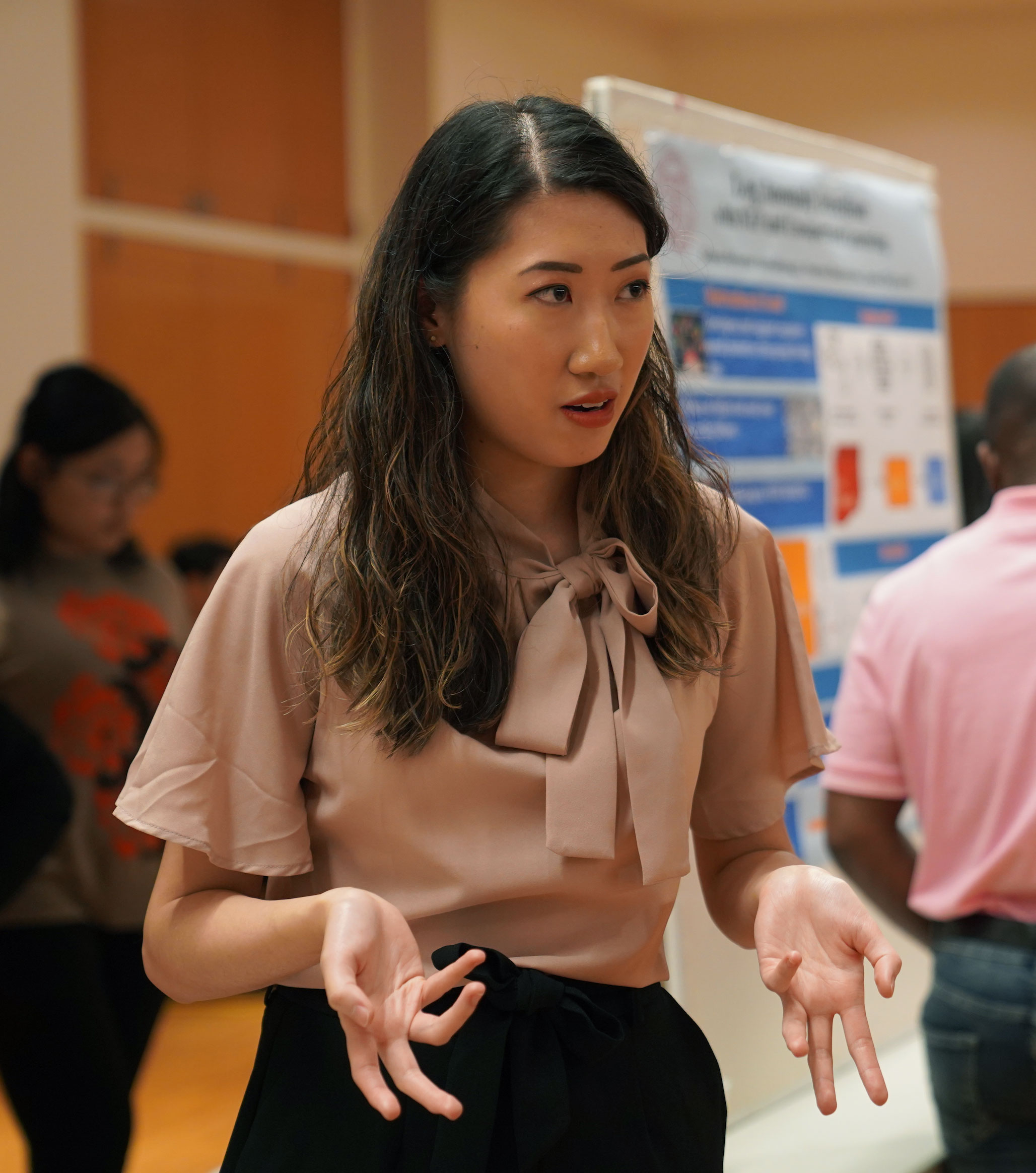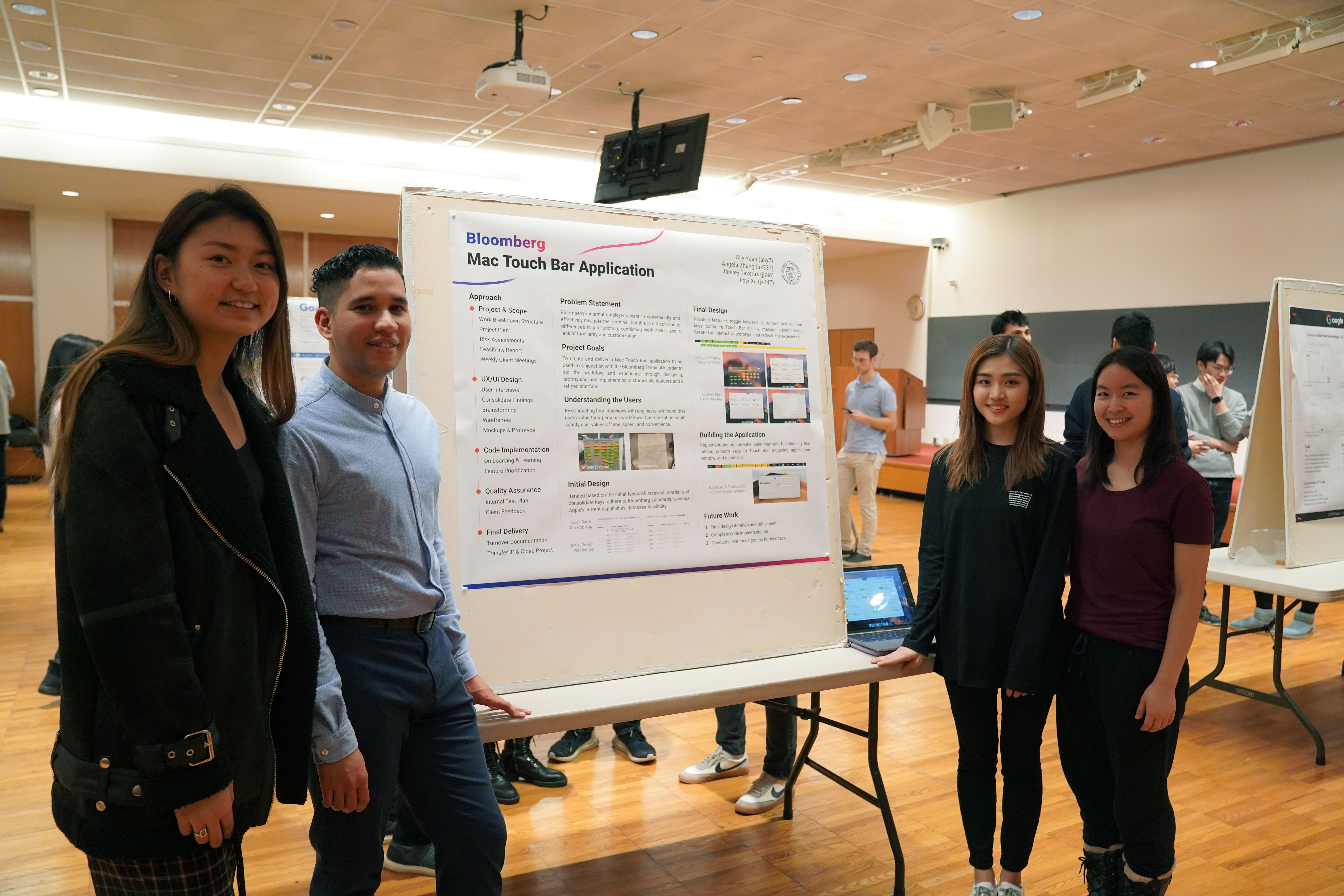The MPS Project Practicum isn’t another course. It isn’t another series of talks in a lecture hall. There is no textbook. There is no written test.
The Practicum, aka INFO 5900, is the linchpin component of Cornell Information Science’s Master of Professional Studies (MPS) program, where students work alongside leading companies, big and small, to build solutions to fix real problems.
MPS-Project-Fall-2019-Cindy-Dou-horiz.jpg

This fall semester, MPS students delivered a program-high 17 custom-designed solutions for companies like Assurant, Bloomberg, Chase Bank, Google, Morgan Stanley, and Workday. User interfaces, platforms, data visualizations, and data processing frameworks were some of the deliverables on display during the semester-end poster session held on the Cornell University campus on Monday, Dec. 9, 2019.
Carolyn Shi, Yuguang Li, and Toby Leung teamed up to build a data visualization tool for Merit SI, a Texas-based sustainable infrastructure company that provides solar and energy storage solutions to industrial clients. The company wanted new interactive visuals to offer clients, information that would show solar viability throughout the U.S. and the potential energy savings through a switch to solar. The Cornell trio delivered: they combed through multiple online sources for any available solar energy data, built an algorithm to clean up the raw data, then synthesized it into heatmap visualizations showing solar viability throughout the U.S. and percentage cost savings.
“We had to source the data from all of these different areas, and they’re all in different formats too,” said Leung, recounting the project’s big challenge. “Just extracting it was a beast in itself.”
Working with Bloomberg, another Cornell team discovered that the financial company’s internal employees wanted a streamlined tool to conveniently navigate Bloomberg’s computer software.
The student team – consisting of Ally Yuan, Angela Zhang, Jancey Taveras, and Jiayi Xu – stepped in to research, design, build and implement a Touch Bar application with quick keys that would seamlessly integrate with Bloomberg’s current computer system.
The final step – implementation – proved the biggest hurdle, according to the team.
“We coded the application in Objective C, which is a language we didn’t have any background in,” Xu said. “So we just learned it and coded it in two weeks.”
For Zhang, a fellow team member on the Bloomberg project, she found the MPS project experience to be rewarding, even the more uncomfortable aspects. At one point, the group foresaw that the project, as originally proposed, couldn’t be completed in a semester’s time. They talked to their Bloomberg client representative, proposed reducing the project’s scope, and outlined what the team would accomplish in the remaining time. The advisor understood, she said.
“That was a very difficult conversation to have,” Zhang said. “It’s difficult to tell a client that you don’t think you can complete the full scope of the project in the deadline you were given. But we also wanted to be very clear and open with our client. From there, our team was able to focus more and prioritize – What is the most important deliverable to hand over?”
This change in project scope is not uncommon, said Jon Saxe, a visiting lecturer in information science and INFO 5900 advisor. When partnering with Info Sci MPS students, corporate clients often don’t know exactly what they want, he said. Instead, clients point MPS students to a problem and hope the Cornell team can come up with an innovative solution.
MPS 2019 Fall Project Bloomberg-team.jpg

“This semester, many of our teams had to negotiate scope and, in some cases, redefine the problem,” Saxe said. “This is typical in a real corporate environment. It was great to see the students rise to this challenge. It is an important part of the learning experience.”
Elsewhere in INFO 5900 this semester:
- Kristi Lin, Ove Hou, Sybil Wang, Amarachi Emeziem, and Colton Zuvich made webpage design templates for Assurant, a global insurance provider, to improve user experience for those looking to, say, file an insurance claim or make a payment.
- Cindy Dou, Yupeng Wang, and James Zhan worked with Dylan’s Candy Bar, a boutique candy shop with locations around the U.S., on an insights visualization interface to help the company identify opportunities for growth.
- Aaron No, Yang Chang, Yifan Xu, and Valentin Porcellini presented Google a user interface design of a web platform for internal data governance.
- Zhuo Chen, Xinye Liu, Yucheng Jiang, and Bryan Hu built Morgan Stanley a working prototype of a computing platform for large dataset processing.
- Jiarui Hu, Chen Lin, Suzanne Lee, Li Chai, Lulu Liang, and Jie Li built Workday a platform where students define their career goals and craft plans to achieve those goals.
INFO 5900 proved extremely valuable, said Leung, who worked on the team tasked with building solar-energy data visualizations.
“The MPS project class is really helpful because it allows us to work with real-life clients and interact with them throughout the semester,” said Leung, a soon-to-be graduate who has accepted a job as a creative technologist in New York City. “That’s an opportunity you can’t get with other classes.”
The MPS Project Practicum is a semester-long, required project for students in Cornell Information Science’s Master of Professional Studies program. In the past, clients have included Google, Microsoft Research, Verizon, Workday, Assurant, and Credit Suisse. If you represent a company interested in proposing an MPS project, please email the MPS project instructor at is-mps-projects@cornell.edu.



